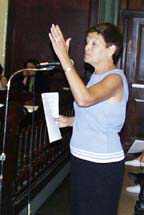Ever since the city began reforming its on-street parking regulations, every conceivable group with parking needs has weighed in on proposed changes. Residents, business owners, teachers, senior citizens, doctors, real estate agents, Boy Scout troop leaders, rental car users, bar owners, commuters, and company car drivers have given complaints and compliments.
Wednesday’s City Council meeting was no different, when questions and concerns about the new parking permit regulations dominated the meeting.
People lined up at the microphone to say why their group deserves use of the city’s limited on-street parking spaces more than another.
Trying to respond to as many groups as possible, the council has tinkered with, changed, revised and revised again the regulations. But now it appears that the council intends to stand pat, at least until the program is implemented next month.
The first person up at the microphone to request a change was Hoboken Parking Authority (HPA) Commissioner Dan DeCavaignac. Monday night, the HPA’s seven-member volunteer board voted unanimously to have DeCavaignac express their concerns about some of the rule changes. Although the idea to change the rules originated with the HPA last year, the proposals underwent changes by the City Council, which is the only body with the authority to change the town’s on-street parking regulations.
DeCavaignac criticized the council for exempting parts of Hudson Street and Bloomfield Avenue from a new rule that will zone the city’s streets for “Resident Parking Only” on one side. In other parts of town, no one with business, visitor or temporary passes can park on the “Resident Parking Only” side of the street. There will be no grace period in those zones. But at the last council meeting, the council voted to exempt Hudson Street from Observer Highway to Fifth Street; Hudson Street from 11th to Fourteenth streets (where the Shipyard project and King’s supermarket are), and Bloomfield Street from Seventh to 14th streets, as well as the entire length of Washington Street.
The mayor requested that the council exempt those streets so that businesses are not too adversely affected by the changes.
All along DeCavaignac has made it clear that providing parking for residents is his number one priority.
“You’re only providing this luxury to certain businesses,” said DeCavaignac about the exemptions. “But there are businesses all over town.”
He added that it is not fair to take those spaces away from the residents of Bloomfield Avenue and Hudson Street, especially since that area of town has some of the biggest parking problems. He contended that visitors and business employees could use the half-empty municipal garages instead of parking on the streets.
Despite his concerns, the council stayed behind the mayor’s decision to give businesses a break in those areas. Members even shot back at DeCavaignac for not promoting the underutilized Park and Shop Program. The program gives shoppers an extremely reduced rate for parking in the garages.
“[The Park and Shop Program] is the city’s best kept secret,” said Council Vice-President Ruben Ramos Jr. “If the HPA would do a better job of advertising that program, maybe more people would use the garages.”
DeCavaignac responded that it doesn’t make economic sense for the HPA to spend money promoting a program that offers such a huge discount in its garages. He said the burden should fall upon the Chamber of Commerce to promote the Park and Shop Program since it is businesses that benefit from the discounts.
Ramos did not agree with DeCavaignac and said that some of the burden to promote the program should fall to the HPA. “West New York’s [Parking Authority] does it, Union City’s [Parking Authority] does it,” he said. “Why doesn’t ours?”
Next at the microphone was Lucile Haack, a Hoboken resident, who also said that it’s a bad idea to exempt those portions of Bloomfield and Hudson streets.
“You’re killing us uptown,” said Haack. “There’re a lot for residents that live up there and you are taking away their parking spaces.”
Again, the council said it will stay firm.
But as has been the case at every City Council meeting lately, as soon as one resident finished complaining about a certain exemption, another group demanded one.
When Haack sat down, a member of the public approached the microphone to go to bat for city teachers.
“I would ask that accommodations be made for teachers,” he said. He added that it’s not fair for educators and persons who provide “essential city services” such and firefighters and police officers to be relegated to only half of the city’s streets.
But several members of the council have said in the past couple of weeks that teachers would not be given special passes. “It’s [the Board of Education’s] responsibly to provide parking for their employees, not ours,” said Councilman Richard Del Boccio, a retired principal, reiterating the council’s position.
Ramos added that while they will not give teachers special consideration when it come to permits, he has contacted a private parking provider near Hoboken High School and asked if it would provide a reduced rate for teachers. The owner of the lot said he would rent spaces to teachers for $50 a month, almost a 75 percent discount on its normal rates.
But what it came down to again Wednesday night is that no matter what program the council implements, there are going to be certain city groups that feel slighted.
Council President Tony Soares said that while its clear that not everyone is going to be happy, it’s important to do something to combat the city’s parking crunch.
“There is never going to be a unanimous point of view,” said Soares. “But we all acknowledge that there is a parking problem and that something has to be done.”
Later, he said that the changes the to city’s on-street parking rules are only a Band-Aid, but are necessary to provide extra parking for the city’s residents.
